Bullish Stock Market Technicals and Seasonal's
Stock-Markets / US Stock Markets Nov 01, 2008 - 04:45 PM GMTBy: Mike_Burk
 The good news is: With a 19.9% advance in the last 4 trading days the Russell 2000 (R2K) is only 0.1% below the popular definition of a bull market.
The good news is: With a 19.9% advance in the last 4 trading days the Russell 2000 (R2K) is only 0.1% below the popular definition of a bull market.
Short Term - Many of the short term indicators are off the charts, trying to read anything into them is too risky.
The chart below gives some perspective into how odd things are. It covers the past year showing the S&P 500 (SPX) in red and the percentage of the component issues of the SPX that are above their 50 day EMA in olive drab. Dashed vertical lines have been drawn on the 1st trading day of each month and dashed horizontal lines have been drawn at 25% intervals for the indicator.
Earlier this month the indicator tied the lowest level ever recorded at 1%. The SPX, up 14.1% in 4 days can be considered overbought while the indicator at 11% can still be considered oversold.
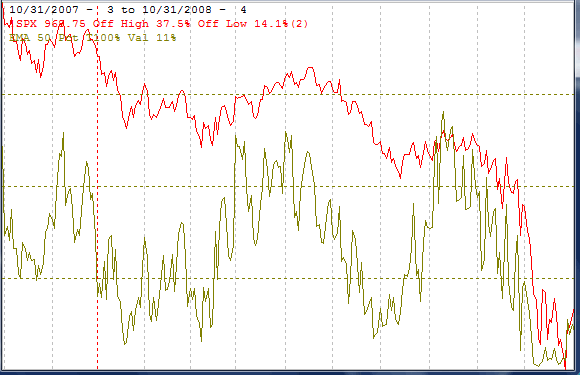
The previous record of 1% was recorded on July 23, 2002. In the 6 days following that record the SPX jumped 14.3% in 6 trading days and the indicator jumped to 27%. The SPX then fell 8.4% in 3 trading days followed by a 15.3% jump over the next 3 weeks. It then fell 19.3% to a new and final low 6 weeks later.
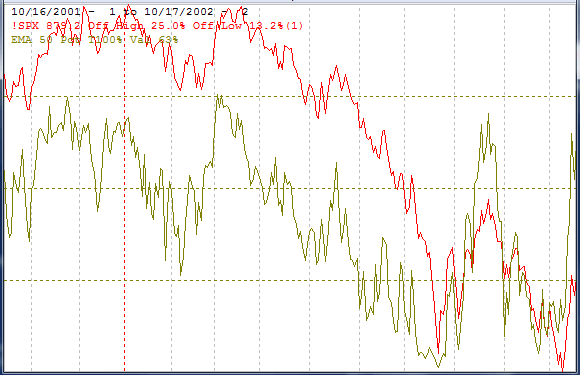
Intermediate term
On Monday there were 748 new lows on the NYSE and 544 on the NASDAQ as all of the major indices hit new lows. These numbers, although well below the record levels recorded October 10, are large enough to imply a high likelihood of a retest of last Monday's lows.
The chart below covers the past year showing the NASDAQ composite (OTC) in blue and a 10% trend (19 day EMA) of NASDAQ new lows (OTC NL) in black. OTC NL has been plotted on an inverted Y axis so decreasing new lows move the indicator upward, up is good.
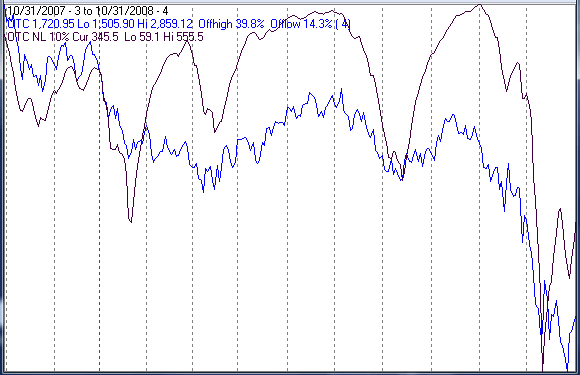
The following charts show how the indicator has behaved at previous bottoms.
The next chart covers 3 years from April 2000 to April 2003. The lowest level for the indicator occurred relatively early in the bear market.
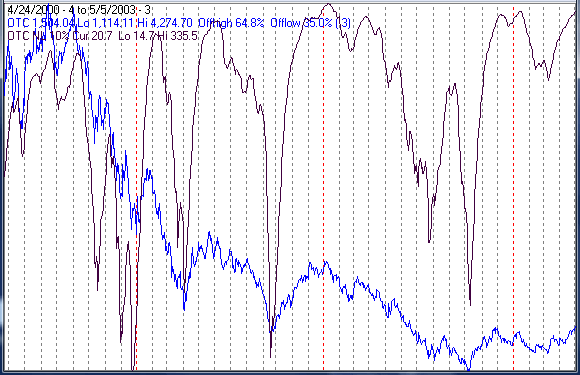
The next chart covers the period from December 1997 through November 1998. This was the most recent of the instant bear markets.
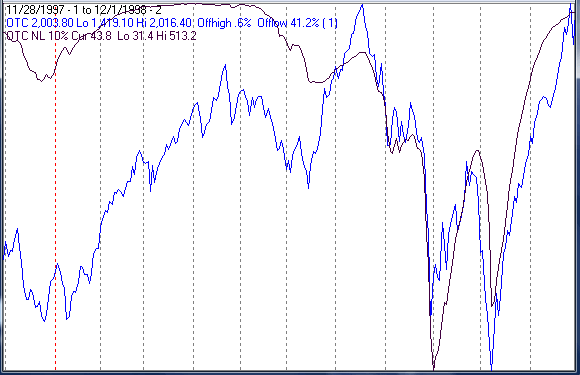
The next chart covers the 1990 bear market. There were several retests.
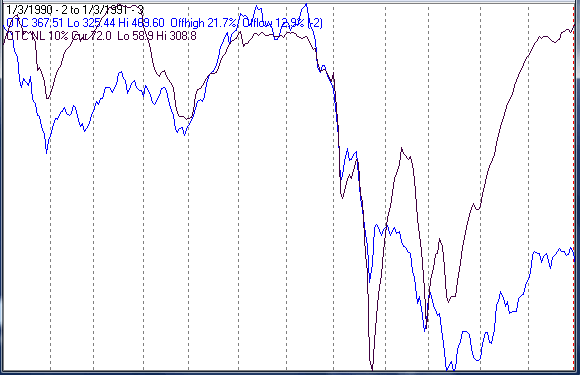
The next chart covers 1987.
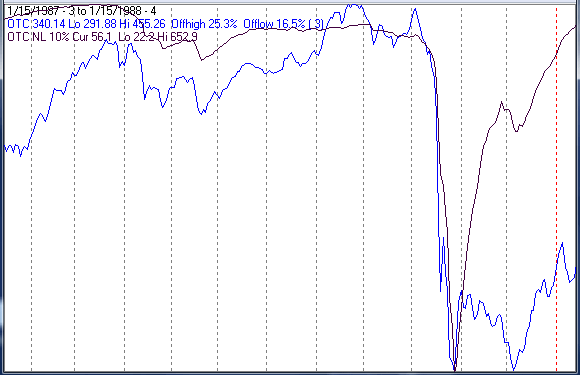
The last chart shows the 1981-82 bear market.
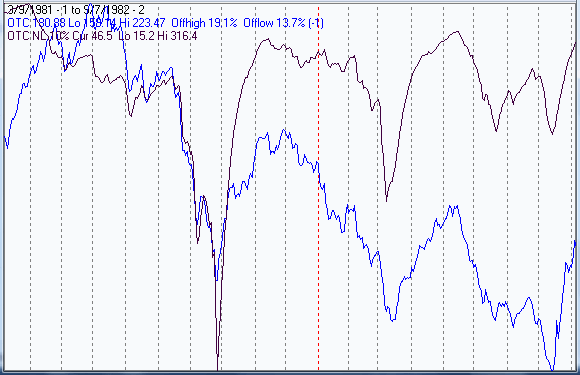
The OTC NL recently hit its all time high (low on the charts) when 88% of the issues traded on the NYSE made new lows on October 10. In 1981 and 2000, the other two prolonged bear markets that we have seen in the past 25 years, the indicator hit its lowest levels fairly early in the bear market. This suggests the final low is, at least, months away.
Seasonality
Next week includes the first 5 trading days of November during the 4th year of the Presidential Cycle.
The tables show the daily return on a percentage basis for the first 5 trading days of November during the 4th year of the Presidential Cycle. OTC data covers the period from 1963 - 2007 and SPX data from 1928 - 2007. There are summaries for both the 4th year of the Presidential Cycle and all years combined.
By all measures the 1st week of November has been strong.
Report for the first 5 days of November.
The number following the year represents its position in the presidential cycle.
The number following the daily return represents the day of the week;
1 = Monday, 2 = Tuesday etc.
| OTC Presidential Year 4 | ||||||
| Day1 | Day2 | Day3 | Day4 | Day5 | Totals | |
| 1964-4 | 0.14% 1 | 0.14% 3 | -0.21% 4 | 0.00% 5 | 0.25% 1 | 0.32% |
| 1968-4 | -0.10% 5 | -0.68% 1 | -0.54% 3 | 0.06% 4 | -0.09% 5 | -1.35% |
| 1972-4 | 1.04% 3 | 0.40% 4 | 0.92% 5 | 0.18% 1 | -0.39% 3 | 2.15% |
| 1976-4 | 0.64% 1 | -1.70% 3 | 0.76% 4 | -0.66% 5 | -0.82% 1 | -1.77% |
| 1980-4 | 0.19% 1 | 1.49% 3 | -1.06% 4 | -0.23% 5 | -0.21% 1 | 0.18% |
| 1984-4 | 0.38% 4 | -0.02% 5 | 0.20% 1 | 0.86% 2 | -0.32% 3 | 1.10% |
| Avg | 0.43% | -0.10% | 0.06% | 0.04% | -0.36% | 0.06% |
| 1988-4 | -0.03% 2 | -0.15% 3 | 0.26% 4 | -0.46% 5 | -1.18% 1 | -1.56% |
| 1992-4 | 0.40% 1 | -0.49% 2 | 0.16% 3 | 1.41% 4 | 0.45% 5 | 1.92% |
| 1996-4 | 0.02% 5 | -0.11% 1 | 0.70% 2 | 1.37% 3 | 0.66% 4 | 2.65% |
| 2000-4 | -1.07% 3 | 2.87% 4 | 0.66% 5 | -1.03% 1 | -0.01% 2 | 1.42% |
| 2004-4 | 0.25% 1 | 0.25% 2 | 0.98% 3 | 0.96% 4 | 0.76% 5 | 3.20% |
| Avg | -0.09% | 0.47% | 0.55% | 0.45% | 0.13% | 1.52% |
| OTC summary for Presidential Year 4 1964 - 2004 | ||||||
| Averages | 0.17% | 0.18% | 0.26% | 0.22% | -0.08% | 0.75% |
| % Winners | 73% | 45% | 73% | 55% | 36% | 73% |
| MDD 11/8/1976 2.41% -- 11/7/1988 1.64% -- 11/10/1980 1.49% | ||||||
| OTC summary for all years 1963 - 2007 | ||||||
| Averages | 0.30% | 0.17% | 0.36% | 0.21% | -0.09% | 0.95% |
| % Winners | 64% | 51% | 69% | 60% | 51% | 73% |
| MDD 11/7/2007 3.86% -- 11/4/1993 3.61% -- 11/6/1973 3.52% | ||||||
| SPX Presidential Year 4 | ||||||
| Day1 | Day2 | Day3 | Day4 | Day5 | Totals | |
| 1928-4 | 1.43% 4 | -0.18% 5 | 0.09% 6 | 1.23% 1 | 1.17% 3 | 3.74% |
| 1932-4 | -2.87% 2 | -3.55% 3 | -0.61% 4 | 6.17% 5 | 1.45% 6 | 0.59% |
| 1936-4 | -0.23% 1 | 1.51% 3 | 0.75% 4 | -0.74% 5 | 1.43% 6 | 2.72% |
| 1940-4 | 0.00% 5 | 0.36% 6 | 0.36% 1 | -3.32% 3 | 5.56% 4 | 2.97% |
| 1944-4 | 0.39% 3 | 0.55% 4 | -0.08% 5 | 0.23% 6 | 0.31% 1 | 1.40% |
| Avg | -0.26% | -0.26% | 0.10% | 0.72% | 1.99% | 2.28% |
| 1948-4 | 0.97% 1 | -4.61% 3 | 1.32% 4 | -4.40% 5 | 0.52% 6 | -6.21% |
| 1952-4 | 0.33% 1 | 0.28% 3 | 0.41% 4 | 0.04% 5 | -0.04% 1 | 1.02% |
| 1956-4 | 2.06% 4 | 0.99% 5 | 1.32% 1 | -1.03% 3 | -0.81% 4 | 2.53% |
| 1960-4 | 1.03% 2 | 0.52% 3 | 0.39% 4 | 0.86% 5 | 0.38% 1 | 3.18% |
| 1964-4 | 0.38% 1 | -0.05% 3 | 0.02% 4 | 0.08% 5 | -0.05% 1 | 0.39% |
| Avg | 0.95% | -0.57% | 0.69% | -0.89% | 0.00% | 0.18% |
| 1968-4 | -0.34% 5 | 0.04% 1 | 0.16% 3 | 0.22% 4 | 0.43% 5 | 0.52% |
| 1972-4 | 0.98% 3 | 0.50% 4 | 0.87% 5 | -0.21% 1 | -0.55% 3 | 1.59% |
| 1976-4 | 0.19% 1 | -1.14% 3 | 0.48% 4 | -1.55% 5 | -1.21% 1 | -3.23% |
| 1980-4 | 1.23% 1 | 1.77% 3 | -1.84% 4 | 0.21% 5 | 0.23% 1 | 1.61% |
| 1984-4 | 0.84% 4 | -0.04% 5 | 0.69% 1 | 1.09% 2 | -0.73% 3 | 1.85% |
| Avg | 0.58% | 0.22% | 0.07% | -0.05% | -0.36% | 0.47% |
| 1988-4 | 0.03% 2 | 0.00% 3 | 0.05% 4 | -1.04% 5 | -0.86% 1 | -1.81% |
| 1992-4 | 0.97% 1 | -0.67% 2 | -0.67% 3 | 0.29% 4 | -0.18% 5 | -0.25% |
| 1996-4 | -0.21% 5 | 0.42% 1 | 1.05% 2 | 1.46% 3 | 0.42% 4 | 3.14% |
| 2000-4 | -0.57% 3 | 0.50% 4 | -0.11% 5 | 0.39% 1 | -0.02% 2 | 0.18% |
| 2004-4 | 0.03% 1 | 0.00% 2 | 1.12% 3 | 1.62% 4 | 0.39% 5 | 3.15% |
| Avg | 0.05% | 0.05% | 0.29% | 0.54% | -0.05% | 0.88% |
| SPX summary for Presidential Year 4 1928 - 2004 | ||||||
| Averages | 0.33% | -0.14% | 0.29% | 0.08% | 0.39% | 0.95% |
| % Winners | 70% | 60% | 75% | 65% | 55% | 80% |
| MDD 11/5/1948 7.60% -- 11/3/1932 6.90% -- 11/8/1976 3.39% | ||||||
| SPX summary for all years 1928 - 2007 | ||||||
| Averages | 0.25% | -0.09% | 0.33% | 0.06% | -0.13% | 0.42% |
| % Winners | 63% | 56% | 66% | 53% | 49% | 66% |
| MDD 11/11/1929 17.76% -- 11/6/1937 9.95% -- 11/5/1948 7.60% | ||||||
Money Supply (M2)
The chart was provided by Gordon Harms. Money supply growth is back up to its elevated level of the past 2 years.
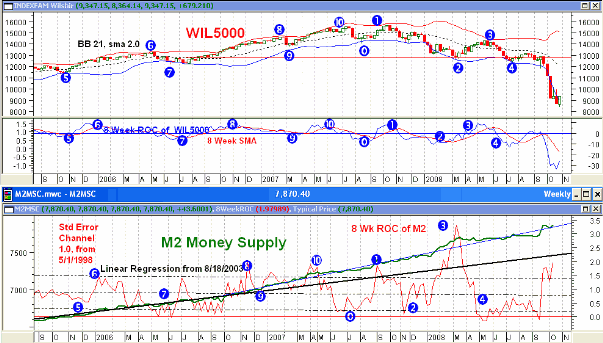
November
Over all years the OTC has been up 67% of the time in November with an average gain of 1.5% second only to January with an average gain of 3.2% and tied for 2nd with April and December. During the 4th year of the Presidential Cycle November ranks 6th with an average gain of 0.5%, but up 73% of the time making it the best month of the year by that measure. Average performance has been distorted by the 22.1% loss in November of 2000. Without the loss in 2000 November would rank as the best month of the year for the OTC.
The average month has 21 trading days. The chart below has been calculated by averaging the daily percentage change of the OTC for each of the 1st 11 trading days and each of the last 10. In months when there were more than 21 trading days some of the days in the middle were not counted. In months when there were less than 21 trading days some of the days in the middle of the month were counted twice. Dashed vertical lines have been drawn after the 1st trading day and at 5 trading day intervals after that. The line is solid on the 11th trading day, the dividing point.
The blue line shows the average of all years since 1963 while the green line shows the average during the 4th year of the Presidential Cycle.
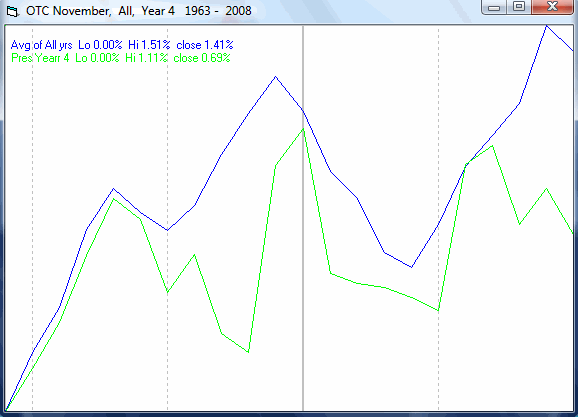
Over all years the SPX has been up 54% of the time with an average gain of 0.4% making it the 8th best month of the year putting it ahead of February, May, March and September. During the 4th year of the Presidential Cycle November ranks 6th with an average gain of 0.7%, up 53% of the time. November of 2000 was also a bad year for the SPX, down 7.5%, but not as bad as November 1948, down 11.7%.
The next chart is similar to the one above except it uses SPX data from 1928. The average for all years is shown in red while the average for year 4 is in green.
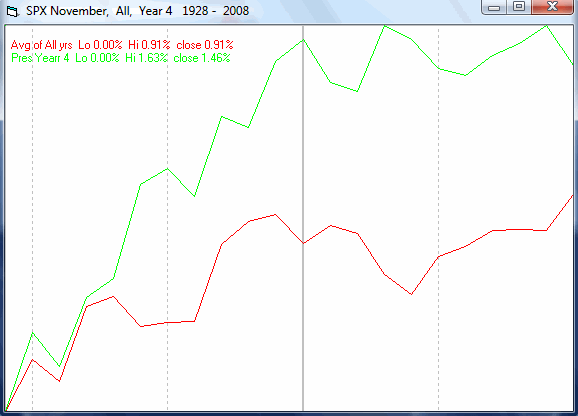
Conclusion
Finally, we have a rally that has lasted more than 1 day, the secondaries are stronger than the blue chips, new lows have dried up and next week has been strong seasonally.
I expect the major indices to be higher on Friday November 7 than they were on Friday October 31.
Last weeks negative forecast was a miss.
Thank you,
By Mike Burk
To subscribe to this report : http://alphaim.net/signup.html
Gordon Harms produces a Power Point for our local timing group. You can get a copy of that at: http://www.stockmarket-ta.com/ .
Disclaimer: Mike Burk is an employee and principal of Alpha Investment Management (Alpha) a registered investment advisor. Charts and figures presented herein are believed to be reliable but we cannot attest to their accuracy. Recent (last 10-15 yrs.) data has been supplied by CSI (csidata.com), FastTrack (fasttrack.net), Quotes Plus (qp2.com) and the Wall Street Journal (wsj.com). Historical data is from Barron's and ISI price books. The views expressed are provided for information purposes only and should not be construed in any way as investment advice. Furthermore, the opinions expressed may change without notice.
Mike Burk Archive |
© 2005-2022 http://www.MarketOracle.co.uk - The Market Oracle is a FREE Daily Financial Markets Analysis & Forecasting online publication.




